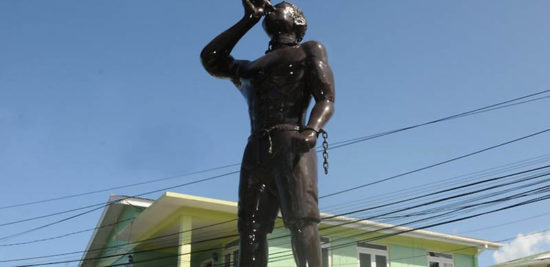
Balla is celebrated as one of the greatest Maroon (Neg Mawon) leaders in the struggle to liberate enslaved blacks during the period of slavery in Dominica. His fearless pursuit in gaining the freedom of the enslaved, which culminated in a brazen attack on the Rosalie estate would gain him international attention and bring close scrutiny to the plight of enslaved blacks in Dominica and the wider Caribbean.
His action and those of his hundreds of followers would also trigger the abolitionist debate in Britain, leading to the eventual abolishing of slavery in the English-speaking Caribbean in 1833. Born in Guinea to a ruling family, and a Prince in his own country, Balla arrived in Dominica in June 1764, and was among the earliest blacks to make the infamous transatlantic journey, after the British began importing enslaved Africans into the country in 1763.
Immediately upon his arrival in Dominica, he successfully escaped from his captors and would not spend one day in captivity. For over twenty years, Balla successfully eluded the authorities, building camps consisting of a committed group of followers made up of hundreds of escaped slaves and their children around the areas of Grand Fond and Rosalie.
He would eventually become the most feared and respected leader of the Maroons earning the title of Chief of the Maroon Chiefs, and was often referred to simply as The General. Between 1763 and 1785, Balla successfully helped in the setting up of Maroon camps around the island. Major camps were established in the heights between Colihaut and Morne Diablotins, headed by Pharcel; in the heights of Castle Bruce, headed by Grubois; between Layou and Rosalie headed by Balla and Congoree; and in Grand Bay presided over by Pangloss. In addition, there were at least four additional camps around Grand Bay.
As the Chief of the Maroon Chiefs, Balla, along with the other leaders successfully ignited a series of attacks on slave plantations, aimed at striking fear in the hearts of the slave owners and forcefully freeing those that were enslaved.
By the year 1781, in what would later become known as the First Maroon War, the Maroons escalated their attacks to include plundering of the estates, killing of white planters and overseers, and the burning of fields and buildings. These surprise attacks were generally carried out in the most secret manner, and usually in the night-time, when they were under no threat of being apprehended.
The attacks on the plantations started in Tarreau then spread to Layou, Colihaut, and other estates during a period of several months. But the most spectacular of these took place at the Rosalie estate on 9 December 1785, which was owned by Lieutenant Governor William Stuart. The brazen attack, reported in scores of newspapers in the United States, Britain, Ireland and Scotland, was led and directed by Balla. By the time the attack was over, Balla and over 200 attackers had killed 4 of the 5 white planters on the estate, seized a large quantity of guns and ammunition, burnt the estate to the ground, killed the livestock and poultry, and freed all of the 180 slaves present that day.
Following this attack, Balla was relentlessly hunted down by British militiamen, freed slaves as well as slaves who were promised freedom in exchange for Balla’s capture. It would take an additional three months until about 2 o’clock on Sunday 18 March 1786, before Balla, the most feared Maroon leader in Dominica was successfully hunted down, shot and killed, less than two miles from the Layou River.
Upon his death, his chest was split open, his heart pulled out, and then his head was cut off. The militiamen then took his guns, about ten pounds of powder, and two children including his son, who had witnessed his death. One day later, the head of the once-feared Maroon Chief was exhibited on a pole, in the marketplace in Roseau.
News of his death quickly spread across the island, and scores turned out to stare at a man who for over twenty years was just a name to many. Throughout Dominica and as word of his death spread the Maroons and slaves on the estate would sing the sad mournful song, ‘Balla mort, bois gatay’ [‘Balla is dead, the tree is spoilt’]. To countless blacks caught in the yoke of slavery, he evoked aspirations of lasting freedom, but to many whites his memory was one of pain and dread.
Following the death of the acclaimed Maroon leader Chief Balla, the authorities continued their unrelenting search for other leaders such as Mabuyah, Pharcelle, Goree Greg, Jacko, Congoree, Mabrie, and Colligrie. In the process, scores of Maroons were captured and executed, with the government admitting to having killed ‘over one hundred men, women and children.’
However, Balla’s death only strengthened the resolve of Dominica’s Neg Mawon to continue to resist plantation slavery. Their bold resistance, struggle, and sacrifice would gain the attention of William Wilberforce and other abolitionists, lending new impetus to the debate to end slavery in the Caribbean.
Note: Extracts of this article were taken from the Book: ‘The Maroons of Dominica 1764 – 1818, Resistance, Rebellion and Freedom From Slavery’ by Thomson Fontaine, and is available at Jay’s Bookstore in Roseau and https://www.amazon.com.

Remember Chef Balla and Jacko and Congoree
We need go find out where he laid to rest and hold a seyance icoke his spirit on the people. Revive the take no prisoners spirit.
We as a people have lost the traits of Bala and the maroons.
1st they ‘educate’ you, today you still going to their church, that’s why.